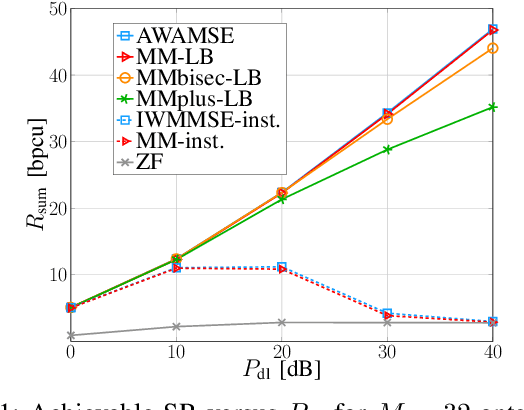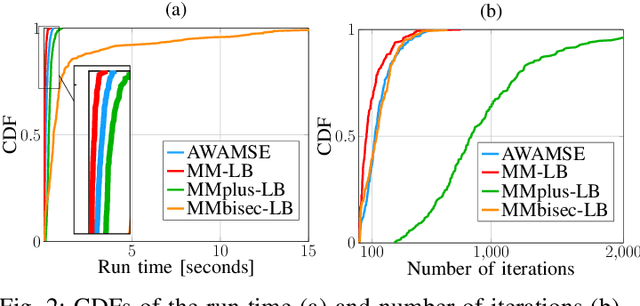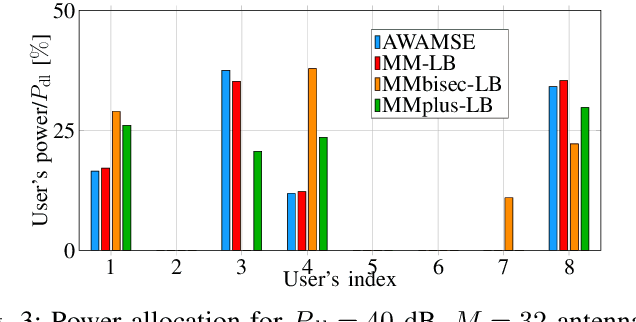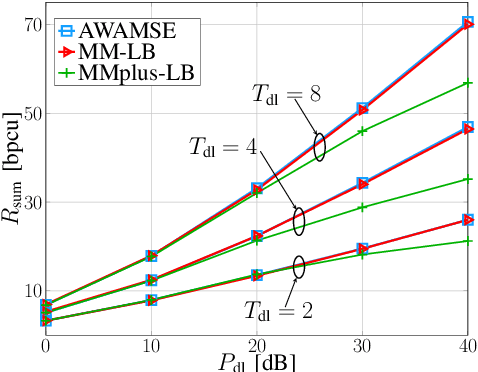Donia Ben Amor
Statistical Precoder Design in Multi-User Systems via Graph Neural Networks and Generative Modeling
Dec 10, 2024Abstract:This letter proposes a graph neural network (GNN)-based framework for statistical precoder design that leverages model-based insights to compactly represent statistical knowledge, resulting in efficient, lightweight architectures. The framework also supports approximate statistical information in frequency division duplex (FDD) systems obtained through a Gaussian mixture model (GMM)-based limited feedback scheme in massive multiple-input multiple-output (MIMO) systems with low pilot overhead. Simulations using a spatial channel model and measurement data demonstrate the effectiveness of the proposed framework. It outperforms baseline methods, including stochastic iterative algorithms and Discrete Fourier transform (DFT) codebook-based approaches, particularly in low pilot overhead systems.
Robust Precoding for FDD MISO Systems via Minorization Maximization
Nov 04, 2024



Abstract:In this work, we propose an approach to robust precoder design based on a minorization maximization technique that optimizes a surrogate function of the achievable spectral efficiency. The presented method accounts for channel estimation errors during the optimization process and is, hence, robust in the case of imperfect channel state information (CSI). Additionally, the design method is adapted such that the need for a line search to satisfy the power constraint is eliminated, that significantly accelerates the precoder computation. Simulation results demonstrate that the proposed robust precoding method is competitive with weighted minimum mean square error (WMMSE) precoding, in particular, under imperfect CSI scenarios.
Bilinear Precoder Based Efficient Rate Splitting Method in FDD Systems
Nov 04, 2024Abstract:In this work, we propose a low-cost rate splitting (RS) technique for a multi-user multiple-input single-output (MISO) system operating in frequency division duplex (FDD) mode. The proposed iterative optimisation algorithm only depends on the second-order statistical channel knowledge and the pilot training matrix. Additionally, it offers a closed-form solution in each update step. This reduces the design complexity of the system drastically as we only need to optimise the precoding filters in every coherence interval of the covariance matrices, instead of doing that in every channel state information (CSI) coherence interval. Moreover, since the algorithm is based on closed-form solutions, there is no need for interior point solvers like CVX, which are typically required in most state-of-the-art techniques.
Design of a Multi-User RIS-Aided System with Statistical Channel Knowledge
May 14, 2024



Abstract:Reconfigurable intelligent surface (RIS) is a promising technology to enhance the spectral and energy efficiency in a wireless communication system. The design of the phase shifts of an RIS in every channel coherence interval demands a huge training overhead, making its deployment practically infeasible. The design complexity can be significantly reduced by exploiting the second-order statistics of the channels. This paper is the extension of our previous work to the design of an RIS for the multi-user setup, where we employ maximisation of the lower bound of the achievable sum-rate of the users. Unlike for the single-user case, obtaining a closed-form expression for the update of the filters and phase shifts is more challenging in the multi-user case. We resort to the fractional programming (FP) approach and the non-convex block coordinate descent (BCD) method to solve the optimisation problem. As the phase shifts of the RIS obtained by the proposed algorithms are based on the statistical channel knowledge, they do not need to be updated in every channel coherence interval.
An Efficient Rate Splitting Precoding Approach in Multi-User MISO FDD Systems
Mar 21, 2024



Abstract:In this work, we develop an efficient precoding strategy for a multi-user multiple-input-single output (MU MISO) system operating in frequency-division-duplex (FDD) mode, where rate splitting multiple access (RSMA) is implemented. To this end, we consider one-layer RS and show its significant impact on the system performance, specifically in the case where the channel state information (CSI) is incomplete at the transmitter. Based on a lower bound on the achievable rate that takes into account the CSI errors, we establish an augmented weighted average mean squared error (AWAMSE) algorithm for the RS setup denoted by AWAMSE-RS, where even the updates for the common and the private precoders are computed via analytical expressions, hence circumventing the need for interior-point methods. Simulation results validate the efficiency of our approach in terms of computational time and its competitiveness in terms of the achievable system throughput compared to state-of-the-art methods and non-RS setups.
Highly Accelerated Weighted MMSE Algorithms for Designing Precoders in FDD Systems with Incomplete CSI
Dec 04, 2023



Abstract:In this work, we derive a lower bound on the training-based achievable downlink (DL) sum rate (SR) of a multi-user multiple-input-single-output (MISO) system operating in frequency-division-duplex (FDD) mode. Assuming linear minimum mean square error (LMMSE) channel estimation is used, we establish a connection of the derived lower bound on the signal-to-interference-noise-ratio (SINR) to an average MSE that allows to reformulate the SR maximization problem as the minimization of the augmented weighted average MSE (AWAMSE). We propose an iterative precoder design with three alternating steps, all given in closed form, drastically reducing the computation time. We show numerically the effectiveness of the proposed approach in challenging scenarios with limited channel knowledge, i.e., we consider scenarios with a very limited number of pilots. We additionally propose a more efficient version of the well-known stochastic iterative WMMSE (SIWMMSE) approach, where the precoder update is given in closed form.
Design of a Single-User RIS-Aided MISO System Based on Statistical Channel Knowledge
Sep 08, 2023Abstract:Reconfigurable intelligent surface (RIS) is considered a prospective technology for beyond fifth-generation (5G) networks to improve the spectral and energy efficiency at a low cost. Prior works on the RIS mainly rely on perfect channel state information (CSI), which imposes a huge computational complexity. This work considers a single-user RIS-assisted communication system, where the second-order statistical knowledge of the channels is exploited to reduce the training overhead. We present algorithms that do not require estimation of the CSI and reconfiguration of the RIS in every channel coherence interval, which constitutes one of the most critical practical issues in an RIS-aided system.
Asymptotic Behavior of Zero-Forcing Precoding based on Imperfect Channel Knowledge for Massive MISO FDD Systems
Jan 20, 2023



Abstract:In this work, we study the asymptotic behavior of the zero-forcing precoder based on the least squares (LS) and the linear minimum mean-square error (LMMSE) channel estimates for the downlink (DL) of a frequency-division-duplex (FDD) massive multiple-input-single-output (MISO) system. We show analytically the rather surprising result that zero-forcing precoding based on the LS estimate leads asymptotically to an interference-free transmission, even if the number of pilots used for DL channel training is less than the number of antennas available at the base station (BS). Although the LMMSE channel estimate exhibits a better quality in terms of the MSE due to the exploitation of the channel statistics, we show that in the case of contaminated channel observations, zero-forcing based on the LMMSE is unable to eliminate the inter-user interference in the asymptotic limit of high DL transmit powers. In order for the results to hold, mild conditions on the channel probing phase are assumed. The validity of our analytical results is demonstrated through numerical simulations for different scenarios.
Rate Splitting in FDD Massive MIMO Systems Based on the Second Order Statistics of Transmission Channels
Jan 26, 2022


Abstract:In this work, we present new results for the application of rate splitting multiple access (RSMA) to the downlink (DL) of a massive multiple-input-multiple-output (MaMIMO) system operating in frequency-division-duplex (FDD) mode. Due to the lack of uplink (UL) - DL channel reciprocity in such systems, explicit training in the DL has to be performed in order to gain knowledge about the single-antenna users' channels at the base station (BS). This is ensured through a feedback link from the users to the BS. Dealing with the DL of a massive MIMO system implies that acquiring the DL channel state information (CSI) comes at the cost of a huge training overhead that scales with the number of BS antennas. Therefore, we limit the resources allocated to training by reusing the pilot sequences among the BS antennas that results in a contaminated channel observation. Despite this incomplete channel knowledge at the transmitter side, the proposed RS approach combined with a statistical precoder relying on the channels' second-order information achieves excellent results in terms of spectral efficiency compared to the state-of-art techniques. This is demonstrated via Monte-Carlo simulations of typical communication scenarios.
 Add to Chrome
Add to Chrome Add to Firefox
Add to Firefox Add to Edge
Add to Edge